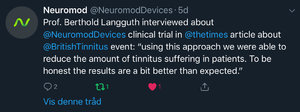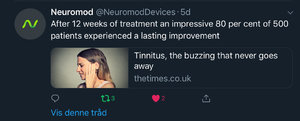Is this device supposed to actually reduce the tinnitus volume or is it supposed to help people habituate like the Levo system?
I believe like the Susan Shore model, it is supposed to reduce it.
Is this device supposed to actually reduce the tinnitus volume or is it supposed to help people habituate like the Levo system?
Can you elaborate? Hyperacusis is somehow due to the brain malfunctioning in the same way as tinnitus is?I have read papers that hypothesized that tinnitus and hyperacusis with pain are two sides of the same coin, this is interesting if true.
The Brain is plastic enough, to adapt to ignoring the sound, when you go to your kitchen do you always hear your fridge, working away? the answer to this is mostly not!!! Try and treat Tinnitus as useless sound and you will notice your T will fade into the background, the more you treat it that way, the less the threat, until one day you will hardly hear it.
The brain is absolutely powerful enough to silence the sound for those with intrusive T. Just look at every person with hearing loss and no tinnitus.
I understand the gate control theory differently. If the gate is open, we ALL have tinnitus. If the gate is closed we don't. That is how I would apply Occam's razor. And I see that as the only logical outcome. I have never seen a tinnitus genesis discussion. There isn't some protein, (such as in Alzheimer's or any of the Lewy Body diseases). Gate control and central gain explain how we can all develop tinnitus through mechanisms as hearing loss, or you can not.That logic is quite unorthodox: Occam's razor would suggest that this person just doesn't have intrusive T (no genesis), not that s/he has T but somehow there is a mechanism that suppresses it on top of it.
I understand the gate control theory differently. If the gate is open, we ALL have tinnitus. If the gate is closed we don't. That is how I would apply Occam's razor. And I see that as the only logical outcome. I have never seen a tinnitus genesis discussion. There isn't some protein, (such as in Alzheimer's or any of the Lewy Body diseases). Gate control and central gain explain how we can all develop tinnitus through mechanisms as hearing loss, or you can not.
IMHO, I do respect yours greatly @GregCA however.
I have never seen a tinnitus genesis discussion.
They are talking about 'reducing tinnitus symptoms' and 'positive therapeutic benefits' but nowhere does it say that it will reduce the volume... Tinnitus symptoms could also be distress or intrusiveness. Guess only time will tell. (I mean, if this device reduced tinnitus, wouldn't they say it? Why keep it a secret if it can lower the volume?)See attached...
View attachment 22369
Realised there is a whole thread on MuteButton... Should have posted there... oops.
The study protocol states that they were going to measure improvement using Tinnitus Handicap Inventory and Tinnitus Functional Index:They are talking about 'reducing tinnitus symptoms' and 'positive therapeutic benefits' but nowhere does it say that it will reduce the volume... Tinnitus symptoms could also be distress or intrusiveness. Guess only time will tell. (I mean, if this device reduced tinnitus, wouldn't they say it? Why keep it a secret if it can lower the volume?)
https://www.irishtimes.com/business...just-the-start-for-neuromod-devices-1.2256123They are talking about 'reducing tinnitus symptoms' and 'positive therapeutic benefits' but nowhere does it say that it will reduce the volume... Tinnitus symptoms could also be distress or intrusiveness. Guess only time will tell. (I mean, if this device reduced tinnitus, wouldn't they say it? Why keep it a secret if it can lower the volume?)
https://www.irishtimes.com/business...just-the-start-for-neuromod-devices-1.2256123
"Mutebutton comprises a set of headphones, a small tongue pad and a compact control unit. O'Neill says it should be used for 30 minutes a day for a minimum of 10 weeks to get results.
In clinical studies carried out by NUI Maynooth in conjunction with The Hermitage Clinic in Dublin the device has been shown to reduce tinnitus loudness by 42 per cent."
My tinnitus distress could be reduced if my society would not be filled with noises loud enough to worsen my tinnitus. That is something they can do, but of course they will not.They can, however, advertise reducing tinnitus distress
If it really is a scam, why didn't they release it in 2015?This is 99.9% another scam.
It is very good to be skeptical, but reality is that we do not know enough to come to any conclusion about the device. There are things that speak to both sides.This is 99,9% another scam.
This device is incredibly similar to Susan Shore's and if you follow the trail of research you would then be aware that people in this research team are ahead of Shore. That is, they were part of the original research that Shore then used to begin her research. This device, Shore's device, and the University of Minnesota device all work on the same principles, just by you using different nervous pathways. In reality, for some of us, this device will work best. For some of us Shore's, and for others UofM's. This is the way why certain medications work better for certain people. Don't fall prey to media and hype. The science is there.
This is no more or no less a scam than any other signal timing device.
I always love seeing your posts! They make me feel so optimistic.
I feel a little confused though. Is this company the same as the University of Minnesota that you are apart of? Or is this something different entirely? If it is something different than there are currently three different stimulation / timing devices being worked on?
Sorry for being so dumb.
I know from Regensburg that the trials with the MuteButton device were unfortunately not successful.
Sorry to say.
Perhaps it is too early for them to have any effect with their technology.


Haha, sorry but that statement just seems taken straight out of a "scammer's handbook"That goes against the data they are putting out.
https://www.thetimes.co.uk/edition/times2/tinnitus-the-buzzing-that-never-goes-away-hxs0vbcmr
"After 12 weeks of treatment an impressive 80 per cent of 500 patients experienced a lasting improvement. "To be honest the results are a bit better than expected," Langguth says. Indeed, they're so promising that the device may be approved in Europe for treatment next year, although he stresses that they offer an improvement, not a cure."
View attachment 22452
View attachment 22453
That goes against the data they are putting out.
https://www.thetimes.co.uk/edition/times2/tinnitus-the-buzzing-that-never-goes-away-hxs0vbcmr
"After 12 weeks of treatment an impressive 80 per cent of 500 patients experienced a lasting improvement. "To be honest the results are a bit better than expected," Langguth says. Indeed, they're so promising that the device may be approved in Europe for treatment next year, although he stresses that they offer an improvement, not a cure."
View attachment 22452
View attachment 22453
